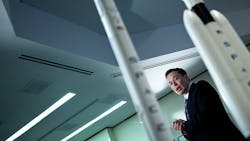Musk’s Reusable Rockets Win US Air Force General’s Endorsement
The head of U.S. Air Force Space Command said he’s “completely committed” to launching future missions with recycled rockets like those championed by SpaceX’s Elon Musk as the military looks to drive down costs.
It would be “absolutely foolish” not to begin using pre-flown rockets, which bring such significant savings that they’ll soon be commonplace for the entire industry, General John W. “Jay” Raymond said in an interview Monday at Bloomberg headquarters in New York.
“The market’s going to go that way. We’d be dumb not to,” he said. “What we have to do is make sure we do it smartly.”
Space Exploration Technologies Corp., founded by billionaire CEO Musk, has employed rocket reusability as a way to lower launch costs and win a growing roster of customers. SpaceX reused its first Falcon 9 booster earlier this year and has since flown two more missions for commercial satellite operators with refurbished rockets.
The Air Force won’t be able to use the recycled boosters until they’re certified for military use, a process that Raymond suggested may already be in the works.
“The folks out at Space and Missile Systems Center in Los Angeles that work for me would be in those dialogues,” he said, declining to specify when certification could take place. “I don’t know how far down the road we’ve gotten, but I am completely committed to launching on a reused rocket, a previously flown rocket, and making sure that we have the processes in place to be able to make sure that we can do that safely.”
Rocket Autonomy
In addition to reusability, Musk is also lowering launch costs by programming autonomy into his rockets, Raymond said. For example, an errant SpaceX rocket is able to sense it’s going off course and blow itself up, if needed, unlike traditional rockets that require a team of hundreds to be prepared for a destruct command from Earth.
Embedding that capability directly into SpaceX rockets reduces manpower needs and saves turn-around time between launches, Raymond said, adding that he’d like to see every range use autonomous capabilities within the next five to seven years.
“I want everybody to go this way and I think the commercial industry that’s developing is going that way because they’re going to have to, to complete,” he said. “It will completely transform the way we do launch operations.”
Autonomy is also a defining tenet for Tesla Inc., where Musk is also CEO. Although driverless cars are still several years away from the average consumer’s driveway, Musk has said Tesla plans to demonstrate a fully autonomous cross-country trip in one of his electric cars by the end of this year — or shortly after.
Military Use
Musk’s Falcon 9 rocket won U.S. Air Force certification for national security space missions in May 2015, breaking a lock long held by United Launch Alliance, a joint venture between Boeing Co. and Lockheed Martin Corp. SpaceX had filed a lawsuit the prior year accusing the Air Force of illegally shutting it out of the market for military satellite launches by only allowing ULA to compete.
Despite that history — which transpired before Raymond took over his post — there’s “no vitriol” between the Air Force and SpaceX, he said, calling the relationship between Musk’s company and the Air Force “strong.” Last month SpaceX launched the classified X-37B Orbital Test Vehicle for the Air Force for the first time after four earlier launches by ULA.
“What Elon has done is significantly reduce launch costs,” Raymond said. “That’s driving reduced launch costs across the world.”
By Anne Riley Moffat and Tony Capaccio, with assistance from Dana Hull
About the Author
Bloomberg
Licensed content from Bloomberg, copyright 2016.
